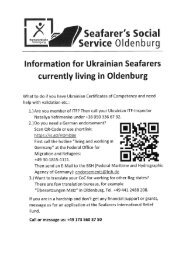Seafarer's Social Service Oldenburg - Jahresbericht 2021
Sie wollen auch ein ePaper? Erhöhen Sie die Reichweite Ihrer Titel.
YUMPU macht aus Druck-PDFs automatisch weboptimierte ePaper, die Google liebt.
To make tangible improvements, the following actions should be implemented:
• Recognize seafarers as key workers and give them priority access to Covid-19 vaccines
Seafarers should be recognized as key workers by all governments in line with the UN General Assembly
resolution adopted on 1 December 2020 and the transition of seafarers across borders should be facilitated
based on internationally agreed, high-quality health protocols.
Governments and other stakeholders should work together with the maritime industry to ensure that
seafarers, irrespective of their nationality, get priority access to Covid-19 vaccines alongside other key
workers and health care professionals in recognition of their critical role in global supply chains and trade.
This should include developing protocols that ensure vaccinations are correctly certified and effectively
administered to seafarers as well as establishing a standardized format for health passes that contain
tamper proof information about vaccination and testing status to facilitate crew changes.
• Establish and implement gold standard health protocols based on existing best practice
The maritime industry and governments should implement The Recommended Framework of Protocols for
ensuring safe ship crew changes and travel during the Coronavirus (COVID-19) pandemic 3 which has been
recognized by the International Maritime Organization.
To minimize the risk of Covid-19, to build trust that crew changes can be carried out in a safe manner, and
to ensure that the measures taken can be universally accepted, the implementation of the Framework of
Protocols should be based on the highest practicable standards. The STAR Crew Change Protocols 4 , which
are based on existing best practice, are thus recommended for industry-wide adoption.
• Increase collaboration between ship operators and charterers to facilitate crew changes 5
Facilitating crew changes based on high-quality health protocols is a shared responsibility which will create
benefits for all by minimizing the risk of Covid-19 spread on vessels, minimizing the risk of disruptions to
global supply chains, while contributing to maritime safety and the wellbeing of seafarers.
Ship owners and charterers should share relevant information transparently and collaborate to ensure that
necessary crew changes can be carried out with the least impact possible in terms of cost and delays. The
owner should provide the charterer with as much notice as possible on intended crew changes, while the
charterer should make all reasonable efforts to accommodate crew changes including when the vessel has
to make a reasonable deviation.
No charter contracts should contain clauses preventing necessary crew changes from being carried out,
as the aggregate effect of such clauses could be a serious obstacle to the safe operation of maritime trade
and the protection of the wellbeing and rights of seafarers.
By implementing high-quality health protocols, ship owners can reduce the risk of trade disruption due
to Covid-19, which also creates benefits to charterers. These benefits should be reflected in chartering
decisions to create incentives for shipowners to implement high-quality health protocols and be
transparent about actions taken as well as costs incurred.
• Ensure air connectivity between key maritime hubs for seafarers
The aviation industry should work together with the maritime industry to ensure that airlift capacity is
established between major crew changing hubs and seafaring nations.
Additionally, the aviation and maritime industries as well as governments – involving all relevant ministries
and agencies – should work together to establish a universally accepted and harmonized framework of
standards for the validation of trusted health data for seafarers to facilitate border crossing and ensure the
long-term resilience of air connectivity.
3 The reference is to the latest version of the Protocols, last updated on 22nd April 2021: MSC.1-Circ.1636 - Industry
Recommended Framework Of Protocols For Ensuring Safe Ship Crew Changes And Travel.pdf (imo.org)
4 http://www.globalmaritimeforum.org/content/2020/12/The-Neptune-Declaration-STAR-protocols.pdf
5 A group of charterers from both the wet and dry bulk sectors has outlined a set of best practices they have used to
turn the Neptune Declaration recommendations into concrete action: http://www.globalmaritimeforum.org/content/2021/05/
The-Neptune-Declaration-Best-Practices-for-Charterers.pdf
Page 2 of 11

















